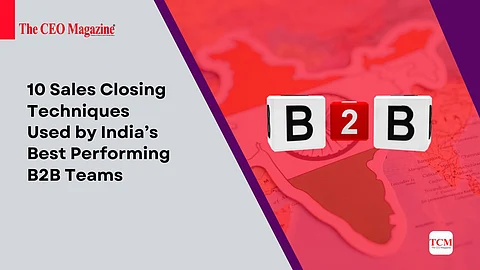
- News
- Women
- Magazine
- IndustryIndustry
- InsightsInsights
- Success Stories
- PublishPublish
- ContactContact
- Media KitMedia Kit

Sales Closing Techniques
In today’s hyper-competitive market, closing a B2B deal isn’t just about charm or persistence — it’s about precision, psychology, and timing.
Let me ask you this:
Have you ever walked out of a pitch knowing you had the perfect solution — yet the client still didn’t sign?
You’re not alone.
After working with high-growth B2B startups, enterprise teams, and sales leaders across India, one thing is clear:
India’s best performing B2B teams don’t "sell" — they close with strategy.
Whether you're a founder leading your first pitch or a seasoned sales director scaling across markets, this guide will give you the 10 sales closing techniques that can transform your B2B outcomes.
Let’s dive in.
In B2B, the sales cycle is longer, the stakes are higher, and multiple decision-makers are involved.
You might spend weeks nurturing a lead — only to lose it at the final mile.
“80% of sales require 5 follow-ups after the meeting. 44% of salespeople give up after just one.”
Salesforce Research
That gap? It’s the closing gap.
And India’s top-performing B2B teams have mastered the art of closing with intention.
Each of the following techniques is tried, tested, and trusted by B2B sales experts across industries — from SaaS to manufacturing.
Imagine this: You’re wrapping up a demo, and instead of asking if they want to proceed, you ask,
“Should I send the onboarding schedule for next Monday or Wednesday?”
This is the assumptive close — used powerfully by teams at Zoho, Freshworks, and Razorpay.
Why it works:
It skips indecision and positions the deal as already moving forward.
“The cost of doing nothing is often higher than making the right investment.”
B2B champions at Infosys and Persistent Systems use this to highlight opportunity cost.
Say this:
“If you wait another quarter, what’s the projected revenue loss or manual hours wasted?”
Pro Tip: Use real metrics from their business. It hits harder.
People like to choose — they hate to be pushed.
Give two choices instead of pushing one.
Example:
“Would you prefer our quarterly plan with extended support or the annual plan with a discount?”
This technique has helped mid-market teams at Chargebee and WebEngage close faster.
In my experience, peer validation is gold in B2B. Especially when your prospect sees competitors already using your solution.
How to use it:
Drop in a success story: “One of our clients in your industry saw a 38% jump in productivity using this.”
Share logos, case studies, or even live client references.
This technique is essential in industries like IT services, SaaS, and manufacturing.
Urgency shouldn’t feel pushy — it should feel real.
Use time-sensitive offers, limited slots, or implementation timelines.
Say this:
“We’re only onboarding 4 clients this month for dedicated support. I’d love to secure your slot now.”
Used effectively by sales teams at Darwinbox and CleverTap.
Executives don’t buy features. They buy outcomes.
Instead of:
“We have AI-powered automation…”
Say this:
“Our platform saved XYZ Corporation ₹1.2 Cr in manual effort in just 6 months.”
Quick Tip: Use ROI calculators in your deck or proposal — many top B2B SaaS players swear by this.
This might surprise you, but the best salespeople know when to say nothing.
When you’ve presented your offer or pricing — pause.
Let them speak first. Let the silence do the work. It builds pressure and encourages response.
“In negotiation, whoever speaks first usually concedes first.” — Chris Voss, FBI negotiator
One of the most common reasons deals stall? No clear next step.
End every conversation with a call to action:
“Can we block time tomorrow for the technical demo?”
“Can I share a draft contract by EOD?”
This micro-closing technique is used religiously by sales teams at TCS and Mindtree.
What’s exclusive gets attention.
Create controlled scarcity — like early access to beta features, region-based support limits, or partner-only pricing.
Example:
“We only onboard one logistics firm per cluster to avoid conflict of interest. Should I keep your zone reserved?”
In complex B2B deals, the real decision-maker might not even be in the room. That’s where the internal champion comes in.
Build a relationship with them. Enable them. Arm them with material to push internally.
“If your internal advocate doesn’t have ammo, your deal doesn’t have a shot.”
Tools that help:
Custom ROI decks
One-pager pitch summaries
Pre-drafted internal emails for stakeholders
A mid-sized SaaS company selling compliance automation software struggled with stalled deals for quarters.
Here’s how they used 3 of the techniques:
ROI Close – Created a visual ROI breakdown: ₹30 lakh annual savings.
Champion Close – Empowered the prospect’s IT Head with data to pitch internally.
Next Step Close – Locked in final proposal reviews with the CFO within 48 hours.
Result?
Closed ₹1.2 Cr worth of contracts in 6 weeks.
Think back to your last 5 deals.
Did you lean too much on product and not enough on ROI?
Did you close every meeting with a next step?
Did you create any urgency — or let the deal drift?
Use these techniques together, not in isolation. And tailor them to your industry, deal size, and buyer persona.
Here’s the truth no one tells you:
Anyone can pitch. Few can close.
And the teams who close consistently? They win market share, investor trust, and customer loyalty.
If you’re building or leading a B2B sales team in India, embed these techniques into your sales DNA. Train your team on them. Role-play them. Refine them.
And most importantly — track what’s working. Because closing is as much science as it is art.
Found this article useful?
Share it with your sales team and bookmark it before your next pitch.
Want more growth playbooks like this? Subscribe to The CEO Magazine Newsletter — your weekly brief on what India’s smartest business leaders are doing.
Follow us on Google News
